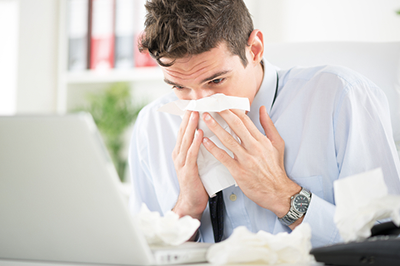Why do I keep getting colds?

We all suffer with a cold or even the flu at one time or another, but sometimes it can feel like a perpetual state. Understanding the causes of recurrent colds and flu will answer those nagging questions, “Why do I keep getting colds?” and “Why do I keep coming down with the flu?” and allow you to take precautions to keep illness at bay.
Want to know more about stopping colds and flu in their tracks? Read our guide to preventing colds and flu.
Common causes of recurrent colds & flu
Not washing your hands properly
If you’re wondering why you keep catching one cold after another, the answer might have to do with how you wash your hands. Ideally, you should wash your hands with warm water and soap for a full 20 seconds, and dry with a clean paper towel. According to the CDC, proper hand- washing could reduce your risk of a respiratory illness – such as a cold or the flu – by up to 21%.
Touching hard surfaces
The flu virus can live for up to 24 hours on hard surfaces like doorknobs, banisters, tables and other hard, non-porous surfaces. Think about how often you touch surfaces like these with your bare skin, then inadvertently touch your nose, mouth or eyes. Each time you do this, you risk transferring cold and flu viruses directly into your body. Regular hand-washing can minimise transmission.
Sharing utensils
While you’re unlikely to share the same cup, plate or cutlery with colleagues, you may share those things with family members – especially children. But even in an office setting, cutlery and cups that aren’t cleaned and dried properly may still harbour viruses. Properly wash and dry all mugs, glasses and plates.
Biting your fingernails
If you keep getting the flu or recurring colds, this habit may be the cause. Putting your fingers in your mouth – even just the nails – makes it easy for a virus to pass from your hands to your mouth, entering your system quickly and easily.
Breathing dry indoor air
Home heating systems result in dry air that can cause your nasal passages to dry out, which in turn makes it easier for viruses to enter your body. Airborne moisture droplets – such as those expelled when someone sneezes – remain airborne for longer in dry air, increasing the chances of inhalation and contagion.
Not eating a healthy diet
A healthy diet with a wide variety of fruits and vegetables, whole grains, lean protein and healthy fats can help your body fight infections. If your diet is lacking in certain foods you could be deficient in vitamins – especially Vitamin C – which contributes to the maintenance of your immune system.
While there is no scientific proof that extra vitamin C makes you less likely to come down with a cold or the flu, it can be a good idea to boost your intake of vitamin C during cold and flu season. The recommended daily intake for vitamin C is 75 mg for women and 90 mg for men. Natural sources of vitamin C include oranges, kiwi fruit, red peppers, blackcurrants, broccoli, brussels sprouts and potatoes (including the skin).
Feed a cold - starve the flu? Learn more about the best approach to eating with a cold or the flu.
Does being cold cause a cold?
Feeling chilly is often put forward as one of the most common causes of a cold, but this is actually just a myth. You can’t catch a cold by being cold unless you’re also exposed to a cold virus. However, cold weather might increase your risk of getting the flu.
Research from Harvard University shows that flu viruses tend to survive better in cooler temperatures, which may help explain the uptick in the number of flu cases following a spell of cold weather. Other research, from Yale University, also suggests that the cold virus is able to replicate itself faster in cooler temperatures.
Treating recurrent colds & flu
If you're suffering from cold and flu symptoms, try Night Nurse Capsules. They offer unbeatable strength* relief from cold and flu symptoms. Find out where to buy Night Nurse products in the UK.